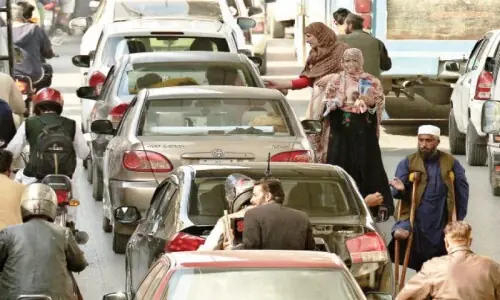THERE is a connection between people throwing trash outside their homes and women being groped on buses, and between low turnouts at civic protests and men using roadsides as toilets. And that is that no one takes ownership of public places in Pakistan.
Public space is experienced differently according to gender and class but the focus here is not how the experiences vary but how they shape the public space itself.
Take sexual harassment of women. Social norms relegate women to the home and men to the world outside. Women enter the public domain only using transport to get to work or going to shops or to move from one private space to another. Even then, sexual harassment is a reminder that they are interlopers in the public space and harassment is the price for transgression.
Elites avoid the public altogether by expanding the private beyond the home to include gated communities and exclusive places of entertainment. Accompanying this is the romance of an imagined sanitised alternative. So while buskers are vanishing from the streets of Karachi and kochis cannot set up temporary settlements under vagrancy laws, a top accessories brand labels itself Hobo and fashion designers exhibit lines called The New Nomads and Gypsy Summers.
For all other women, the public place is male space. But which men does it belong to? Men cannot ensure the behaviour of other men so cannot freely bring women, limiting their claims to ‘user’ rights but not to joint ownership. So the public place is not simply men’s space, but ‘other’ men’s space.
Women are seen as interlopers in the public space.
When women retract from the public, it impacts the space itself not just by filtering out half the population but also by alienation. For all men, its claimants are all other men, in effective, no one. As a result, no one feels like that it is their own space. It is this that shapes our public culture.
Women frequently concede. The burqa makes the wearer simultaneously there and not there, a symbolic communication that terms and conditions have been accepted. This anonymous power regulates citizens but also frees them from responsibility towards it. This is why there is no outcry when public places are confiscated or encroached, whether in the name of security or development.
The links between public spaces and democracy is well established. From the Greek agoras and Roman forums onwards, people have understood the exercise of democracy needs inclusive common spaces where citizens can interact, feel a sense of connection, individually express and collectively dissent.
Prague’s Wenceslas square, Kiev’s Independence square, Istanbul’s Taksim square, China’s Tiananmen, Paris’s Place de la Republique, America’s National Mall, these spaces did not enter history because of flash mobs; there was a preceding public culture of assembly and interaction. The one thing that marred the spirit of collective resistance in the heady days of the Tahrir Square protests in Cairo was women’s experience of sexual assault.
Sexual harassment is so common that it is a part of the everyday, ranging from sleazy comments to groping. An extreme case was the gang rape at the most symbolic of all public places in the country — the Mazar-i-Quaid. In 2008, a young woman visitor from Lodhran was raped by employees of the Mazar. After a five-year-long ordeal of a trial, they were acquitted by the court which dismissed DNA evidence in favour of the four-witness requirement of the Hudood Ordinance. On the other side is the absence of women — it is entirely possible to drive through small cities and towns of Pakistan without seeing any women at all, unless one goes to the fields and sees them labouring.
It is in this context that Sabeen Mahmud’s work for claiming public spaces was and remains critical, and why the emergent initiatives of girls loitering at dhabas or playing street cricket, women blockading roads in protests or driving pink rickshaws in Lahore are potent ideas. More so when all the female traffic wardens recruited for patrolling duties in Lahore have now been given desk assignments because of the sexual harassment they faced by commuters.
Democratisation of public places cannot be ordained by a political party by designating a spot for people to sing and dance — with which they otherwise have no affinity or no access to — anymore than a previous military dictator could announce a 33pc quota for women in politics and expect it to be sustained. Such change must be organic and incremental. The recent lost battle to name a chowk after Bhagat Singh is a case in point.
It is self-defeating to expect thousands to show up at a protest for human rights violations. While well-intentioned citizens try to build progressive politics, it can’t be done without changing public culture itself. And no, it won’t happen on Facebook.
The writer is a researcher and consultant in the social sector.
Twitter: @Nazish_Brohi
Published in Dawn, October 15th , 2015
On a mobile phone? Get the Dawn Mobile App: Apple Store | Google Play

































